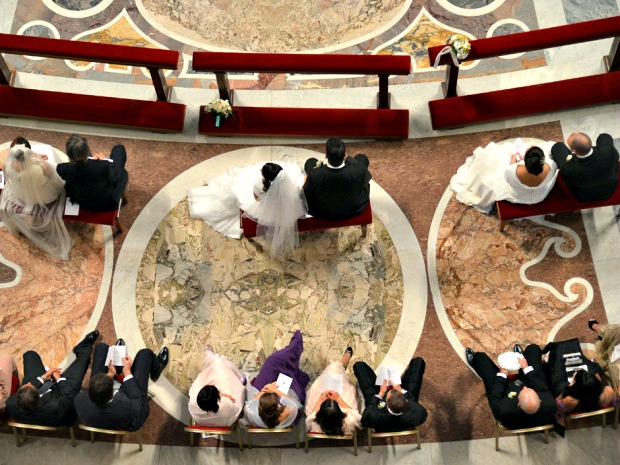
In advance of the synod on the family next month, Cardinal Raymond Burke, head of the Church’s highest court, said it is “impossible” for the Church to make changes to its teaching on marriage.
“I don’t think you have to be brilliant to see that the media has, for months, been trying to hijack this synod,” said Burke, according to Ann Schneible at National Catholic Register.
Burke, whose office handles annulment cases in the Church, said some media are attempting to falsely encourage expectations that changes will be made to Church doctrine regarding marriage.
For example, Burke observed that some media outlets are presenting Pope Francis as favorable toward allowing those who are divorced and remarried to receive Holy Communion, even though this is not the case.
Burke said there is a danger that “the media has created a situation in which people expect that there are going to be these major changes which would, in fact, constitute a change in Church teaching, which is impossible.”
“That’s why it’s very important for those who are in charge to be very clear,” he added.
Much debate surrounds the synod, which will take place October 5-19, and the question of whether the Church should change its pastoral practice to allow divorced and remarried individuals to receive Communion.
Liberal theologian Cardinal Walter Kasper urged a discussion about Church teaching on this subject, and Burke and several other cardinals responded with a book entitled Remaining in the Truth of Christ: Marriage and Communion in the Catholic Church.
The book, which will be released in October, is a compilation of essays that respond to the claim that some divorced-remarried Catholics may be admitted to Communion without having obtained an annulment, in which the Church recognizes that the first marriage was never valid.
As Breitbart News’ Dr. Thomas Williams reported last week, Cardinal George Pell, who has been assigned by Pope Francis for the reform of the curia and the Vatican Bank, also opposes Kasper in his views on marriage.
“Doctrine and pastoral practice cannot be contradictory,” wrote Pell. “One cannot maintain the indissolubility of marriage by allowing the ‘remarried’ to receive Communion.”
Cardinal Burke explained that the Church’s teaching on this subject of marriage is merciful “because it respects the truth that the person is indeed bound by a prior union which the person, for whatever reason, is no longer living.”
“The Church holds the person to the truth of that marriage,” Burke continued, “while at the same time being compassionate, understanding the situation of the person, welcoming them into the parish community in ways that are appropriate and trying to help them to lead as holy a life as they can, but without betraying the truth about their marriage.”
Burke said the Church extends mercy here because “it simply makes no sense to talk about mercy which doesn’t respect truth. How can that be merciful?”
The cardinal said the book is a defense of marriage at a time when there is a “tremendous amount of confusion and even error,” from both within and outside the Church on the subject.
“It’s very important at this time,” the American cardinal continued, “to show the splendor of the truth of the Church’s teaching about marriage, which is foundational, obviously, for society and for the Church itself.”
“If we don’t get it correct about marriage, there’s very little else that we’re going to be clear about,” he asserted.
Burke reflected on his experience that many bishops say couples today who are divorced “don’t care anymore about the question of nullity.”
About the criticism that the procedure of obtaining an annulment is merely judicial, the cardinal emphasized that the process pertains to “the very foundation of the life of the Church: the matrimonial union.”
“The Church has to have an apt process to arrive at the truth about that claim,” Burke said, regarding whether or not a marriage has been null.
“But to simply have people come before what’s called an administrative process or a so-called ‘pastoral process,'” one in which “people simply tell their story to a priest,” who then makes the decision with regard to their reception of the sacraments — “how does that respect the truth of Our Lord’s teaching about marriage?”
Burke expressed his hope that the upcoming synod “will set forth the beauty of the Church’s teaching on marriage, in all its aspects, as a union between one man and one woman, faithful, indissoluble for life and procreative.”
He added that he hoped the synod would stress the teaching of Pope Paul VI in his encyclical Humanae Vitae.
As Breitbart News’ Austin Ruse reported last week, Pope Francis reportedly plans to remove Burke from his position as head of the Apostolic Signatura – the Vatican’s version of the Supreme Court – and assign him to the largely ceremonial role as head of the Sovereign Military Order of Malta.
However, as current prelate of the Apostolic Signatura, Burke will have a primary role in discussions regarding the marriage-nullity process, specifically in light of the suggestion to streamline the annulment process.
“I wouldn’t be at all opposed to any changes,” he said, “except that a certain amount of complexity is required by the complexity of a claim that a marriage is null. And you cannot simply deal with these kinds of questions by some kind of easy and lighthearted process.”
A synod can be a positive event, Burke said, “as long as it’s firmly grounded in the Church’s doctrine and discipline regarding marriage. But it cannot simply be a kind of sentimental or personal approach that doesn’t respect the objective reality of marriage.”

COMMENTS
Please let us know if you're having issues with commenting.